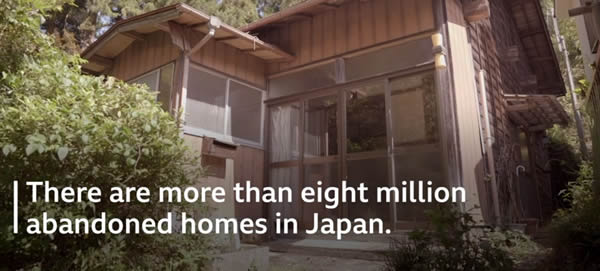先日から「What will Japan do with all of its empty ‘ghost’ homes? – 日本は「空き家」をどうするの?」を読んでいます。

・「日本は「空き家」をどうするの?」(1)
・「日本は「空き家」をどうするの?」(2)
Empty homes in oversupply
空き家は供給過剰
In rural Okutama, a quiet, mountainous town in the north-western valleys of Tokyo prefecture two hours from the capital, akiya are in oversupply.
都心から2時間ほどの静かで山がちの町、奥多摩では、空き家は供給過剰になっている。
Four years ago, Okutama Council’s Youth Revitalisation Department started a programme to use the akiya donated by heirs who preferred giving away homes to leaving them vacant.
4年前、奥多摩では相続者から寄付された空き家を再活用する部署を立ち上げた。
New tenants who take on an akiya can pay a small monthly fee across 15 years, after which they’ll get the property’s title as well as fees refunded.
新しい借主はわずかな月額賃料を支払い、15年たったらその物件をもらえる上に、支払った賃料まで返してもらえる。
In effect, the rent contributes to a small portion of the property tax, with the council providing them with help on the rest.
その結果、わずかでも税収が見込めるようになり、それが地域の助けにもなる。
Still, despite the town facilitating basic architectural maintenance, offering an additional allowance of up to $18,000 to renovate the property and including free children’s services for prospective tenants, Okutama is still struggling to find new residents
だが奥多摩町では物件の基本的なメンテナンスを促進したり、最大約200万円(18,000ドル)までのリフォーム補助金を出したり、将来の借り手となる子供への各種無償サービスを提供しても、まだ借り手を探すのに苦労しており
facilitate「促進する、容易にする、楽にする」。
- especially with other schemes subsidising family housing that include newer homes.
特に家族向け住宅では、築年数の浅い物件が求められている。
So far only seven families in Okutama have chosen to opt for akiya, according to the council.
奥多摩町によると目下、空き家への移住を選択したのはたったの7組だという。
opt for~「~を選ぶ・選択する」。
Dr Chie Nozawa, professor of science and engineering at Toyo University, predicts the akiya problem will grow largest in central areas of big cities that haven’t found solutions to revive older neighbourhoods in which populations are declining rapidly.
東洋大学の野沢教授によれば、今後も人口減少が加速度的に進む中で、空き家問題は大都市圏でも解決策が見いだせないまま、大きな悩みの種になるだろうとのこと。
This is especially the case as suburban towns spring up with new housing in lieu of residents taking up akiya.
今回の例は郊外の町に起きた空き家の引継ぎ問題だ。
in lieu of~「~に代わる」。
spring up「発生する、起きる、存在にいたる」。
This means that the future of these buildings – and, often, the small towns hoping to court residents to live in them – depends on whether or not local councils take strategic action to utilise akiya.
それはつまり、将来的にはそうした物件、さらには空き物件の借り手を探したい小さな町では、否が応でも戦略的行動が必要となる。
depend on whether~「~かどうかによる」。
depends on whether or not local councils take strategic action to utilise akiya
(地方自治体が空き家を活用するために戦略的行動を取るかどうかによる)
=「(地方自治体が空き家を活用したいならば)否が応でも戦略的行動が必要」。
“Solutions need to be implemented to bring in new generations,” says Nozawa,
「新たな世代を引き込みたいならば、解決策を実行に移さねばなりません」と野沢教授。
implement「道具、手段、手先、履行する、実行・実施する、(要求・条件・不足などを)満たす」。
“or otherwise the rapidly declining population will only fuel more vacant towns and buildings.”
「でなければ、急速に進む人口減少により、空き家や町の過疎化が進むばかりです」。
- 完 -
記事によると、抜本的な空き家活用策はまだないのかな~という感じですね。
前に「月曜から夜ふかし」でやっていましたが、東京の池袋でさえ、数十年後には「消滅可能性都市」になるとか。
それが本当だとすれば、ましてや地方都市なんて寂れるに決まってる・・・ですよね。
人口がどんどん減ったら、残っている人はどうするのか、やっぱり便利な場所にどんどん吸い寄せられて、辺鄙な場所はゴーストタウンになるんでしょうか。
そうなったらインフラ整備もおぼつかなくなって、人が少ない土地で暮らしていくのは難しくなりそうですよね。
となると大都市以外で今からローンを組んで家を買うようなことは、ちょっと考えてしまいますが、借り手にとっては選り取り見取りで楽しい時代が来るかもしれませんね。
理由は単純明快!「少ないコストでしっかり楽しく学べるから」。
私自身の経験(高機能でビックリ)をびっしり書いていますので、良かったら読んでみてください。
下のバナーからどうぞ!






